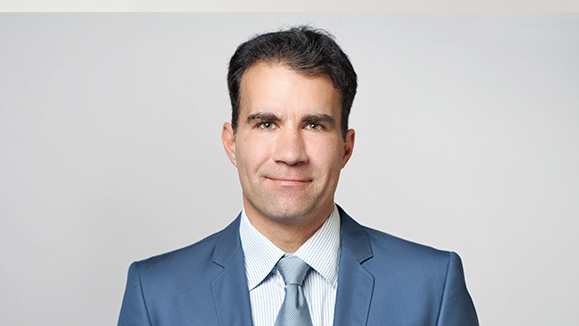Digital Economy
Digital Economy News | May 2025
Germany’s digital economy will receive a boost from the incoming coalition government through the creation of a new digital ministry. In other news, Germany is taking on a key role in European satellite communications and Karlsruhe Institute of Technology and IBM expand their AI partnership.
May 02, 2025
- New Coalition Government’s Digital Plans
- Germany Takes on Key Role for Future Satellite Communication Services
- New Games Funding Rules
- KIT and IBM Expand AI Cooperation
- Circus Announces Serial Production of CA-1 Robot
- Quantum Alliance Supports Young Researchers and Scientists
- Brighter AI Acquired by Milestone Systems
New Coalition Government’s Digital Plans
Germany’s coalition government in waiting has announced plans to create a new digital ministry as part of its plans to drive the country’s digital transformation. Central to these plans are efforts to strengthen Germany as a beacon for data centers in Europe by supporting clusters as well as regional and decentralized company establishment. Plans are afoot to bring at least one of the European “AI Gigafactories” to Germany, with the planning and integration of data centers into the power grid being facilitated through a digitalization offensive involving grid operators made possible through greater grid connection capacity transparency. As part of the planned data center roll-out, the construction and expansion of data centers, particularly in eastern Germany, will be accelerated with prohibitive red tape eliminated where necessary. The government-in-waiting’s digital proposal are part of a plan to safeguard Germany’s digital sovereignty in areas including AI, quantum robotics, ICT, photonics, and micro- and nanoelectronics.
Germany Takes on Key Role for Future Satellite Communication Services
The European Union has selected the city of Cologne in the state of North Rhine-Westphalia as the home for the “GOVATSCCOM Hub” and “IRIS2” future satellite communication services programs. The federal government, the federal state and the German Aerospace Center have worked in close partnership to ensure that the city be selected for the site that will create a central component for European satellite communication solutions operating out of the country and establish an important element for the long -term operational phase of the IRIS2 multi-orbit satellite constellation to be deployed by 2027. The move will further strengthen Cologne’s claims to be an important aerospace research hub, coming on the recent opening of the LUNA training and technology center in the city. The proposed hub will be used to control and coordinate the supply and demand of all central services of the new satellite systems including the planning and control of innovative quantum communication services via satellites as part of the EuroQCI initiative.
New Games Funding Rules
Federal funding rules for games companies have been revised as part of plans to help make Germany more attractive and competitive as a location for games production. Projects with a minimum project and maximum project size of EUR 300,000 and EUR 2 million respectively are eligible for funding. Game developments with eligible development costs of up to EUR 900,00 can be funded from the federal government’s cultural and media policy, with all game developments and prototypes exceeding this amount receiving funding from the Federal Ministry for Economic Affairs and Climate Action. Large companies will receive up to a maximum of 25 percent, small and medium-sized companies a maximum of 45 percent, and start-ups a maximum of 50 percent of costs with the funding issued as a non-repayable subsidy.
KIT and IBM Expand AI Cooperation
The Karlsruhe Institute of Technology (KIT) and IBM are expanding their longstanding AI cooperation in the fields of generative AI and digital innovation. The strategic partnership is intended to strengthen research, teaching and dialogue between science and industry. Focal points including human-machine collaboration, AI-based services and digital platforms. A central element of the partnership will be the establishment of a new IBM-supported tenure track professorship for business informatics at KIT’s Institute for Information Systems.
Circus Announces Serial Production of CA-1 Robot
Leading AI robotics company Circus SE has announced serial production plans for its autonomous food production CA-1 robot in May 2025. The proprietary solution can deliver up to 2,000 freshly prepared meals per day and occupies just 20 sqm of space. Last year the Circus Group signed a preliminary agreement to launch its autonomous food supply system for employees at the Berlin Brandenburg Airport, the third-largest airport in Germany. The agreement includes the deployment of the CA-1 robot by Circus to cover a share of the daily employee catering at the BER Airport in parallel with regular operations.
Quantum Alliance Supports Young Researchers and Scientists
The Quantum Alliance, a consortium of Germany’s clusters of excellence and research centers that work in quantum science and technologies (QST), is providing support to early-career researchers and young scientists at participating institutions. The umbrella initiative provides access to Germany’s most important QST centers, giving young QST professionals an overview of all clusters of excellence and research center members in the country’s rich quantum research landscape.
Brighter AI Acquired by Milestone Systems
The Berlin AI start-up brighter AI has been acquired by Milestone Systems. The Berlin company provides anonymization solutions for video data based on state-of-the-art AI deep learning technology to protect private individuals’ identities in public. Danish company Milestone Systems, part of the Canon Group and specialized in video management solutions, has bought the anonymization solutions specialists in part of a deal that will see the brighter AI workforce maintained as a separate business area within Milestone Systems.
